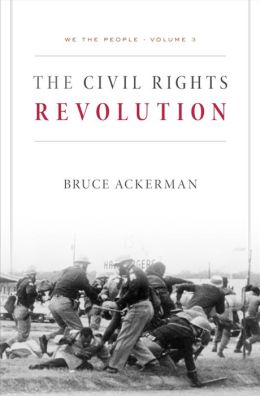New from Harvard University Press: the
third volume of
Bruce Ackerman's
We the People. From the Press:
The Civil Rights Revolution carries
Bruce Ackerman’s sweeping reinterpretation of constitutional history into the era beginning with
Brown v. Board of Education.
From Rosa Parks’s courageous defiance, to Martin Luther King’s
resounding cadences in “I Have a Dream,” to Lyndon Johnson’s leadership
of Congress, to the Supreme Court’s decisions redefining the meaning of
equality, the movement to end racial discrimination decisively changed
our understanding of the Constitution.
Ackerman anchors his discussion in the landmark statutes of the
1960s: the Civil Rights Act of 1964, the Voting Rights Act of 1965, and
the Fair Housing Act of 1968. Challenging conventional legal analysis
and arguing instead that constitutional politics won the day, he
describes the complex interactions among branches of government—and also
between government and the ordinary people who participated in the
struggle. He showcases leaders such as Everett Dirksen, Hubert Humphrey,
and Richard Nixon who insisted on real change, not just formal
equality, for blacks and other minorities.
The Civil Rights Revolution transformed the Constitution, but not
through judicial activism or Article V amendments. The breakthrough was
the passage of laws that ended the institutionalized humiliations of Jim
Crow and ensured equal rights at work, in schools, and in the voting
booth. This legislation gained congressional approval only because of
the mobilized support of the American people—and their principles
deserve a central place in the nation’s history. Ackerman’s arguments
are especially important at a time when the Roberts Court is actively
undermining major achievements of America’s Second Reconstruction.
A few blurbs:
“Bruce Ackerman has already transformed our understanding of the Constitution and constitutional interpretation. With this essential volume, he enables us to view the civil rights revolution in an entirely new way.”—Laura Kalman
“The American people have reconstructed their constitutional system from time to time, but these ‘constitutional moments’ never roll out exactly the same way. The Civil Rights Revolution, the third volume of the Ackerman synthesis, sorts through the differences among these transformations, bringing to light the common principles and processes that impart foundational status to their institutional and normative commitments. Today, with the legacy of the civil rights revolution in doubt, Ackerman’s benchmarks are invaluable, both for assessing the constitutional commitments established in those years and for evaluating the legitimacy of efforts to upend them.”—Stephen Skowronek
More information is available
here.
